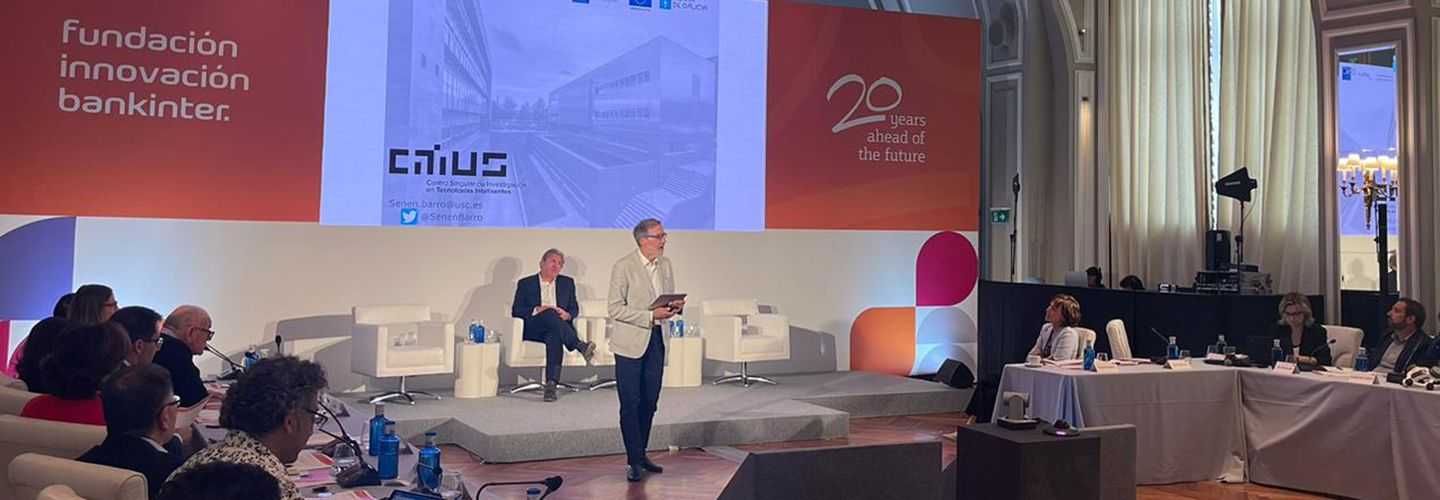
Senén Barro presents CiTIUS at the 20th anniversary of the 'Future Trends' forum
The scientific director of CiTIUS introduced some of the centre's research lines with potential application in the field of neurotechnology, as a guest speaker at the Bankinter Foundation of Innovation's Think Tank
"Today I will only mention three; but, in one way or another, all CiTIUS research lines have a potential application in neurotechnology". With these words Senén Barro began his speech today at the forum 'Our future selves: from repairing to enhancing human capabilities', a meeting organised within the framework of 'Future Trends', a *Think Tank' promoted by the Bankinter Foundation of Innovation, which in 2023 celebrates its twentieth edition.
Throughout his intervention in this meeting, framed in a panel entitled 'Artificial Intelligence and Neuroscience Entities', the head of CiTIUS shared a poster with Viktor Jirsa, scientific director of EBRAINS: a new digital research infrastructure funded by the European Union through the Human Brain Project, which brings together a wide range of data and tools for brain-related research.
After a brief introduction about the centre and its staff, Senén Barro outlined some of the recent results of CiTIUS. Firstly, he highlighted recent contributions in the area of smart chip design: "One of the main results of our scientific area related to the electronic design of smart devices is the development of a biocompatible and fully autonomous light energy harvester," he said. "Also in the area of chip design, he cited the centre's participation in the MISEL project, "whose objective is to bring artificial intelligence to the hardware itself" (*edge computing), "*and to achieve an autonomous and bio-inspired vision system, optimised both in size and in weight and consumption". A project that opens the way to a new generation of devices "potentially implantable, even in the brain".
The scientific director also cited the work developed in the Intangible Realities Laboratory at CiTIUS, which is involved in how multi-person Virtual Reality can be used in contributions to fields such as scientific simulation, data visualisation or education. "One of the most recent and interesting results shows that VR can produce perceptual effects comparable to those of psychedelic drugs, without the associated risks," he added.
Finally, Senén Barro alluded to the line of research focused on the Federated Learning paradigm: "We have applied this technique to automatically detect a person's physical activity, simply by using the inertial sensors of their smartphone," he said. "But it is also possible, for example, to diagnose the early stages of Alzheimer's disease from movement patterns during our daily lives, or to diagnose Parkinson's disease from typing patterns on the keyboards of personal devices, when the disease starts to appear. The centre's director emphasised one of the key issues, data privacy: "One of the characteristics of Federated Learning is that the data obtained from each device is only used to learn a local model, which will then be used as part of a global model. "The main advantage of this", he said, "is that this global model offers better output results than local models and, at the same time, it is able to preserve the privacy of users, because the data used to create the exported model never leaves the devices, thus respecting the privacy of individuals". "Without a doubt, the possibilities of neurotechnologies and AI are enormous, and are yet to be discovered and developed," he concluded.
Future Trends Forum: two decades reflecting on the future
With this edition, the Future Trends Forum (FTF) of the Fundación Innovación Bankinter celebrates 20 years of bringing together prestigious experts who delve into the frontiers of innovative knowledge. It is a think tank (also known by the anglicism "Thinl tank"), a group of experts, international benchmarks in their fields, who reflect on or research relevant issues to analyse the trends that will define the future, with a clear purpose: to anticipate and share the knowledge that will enable society to be transformed through innovation.